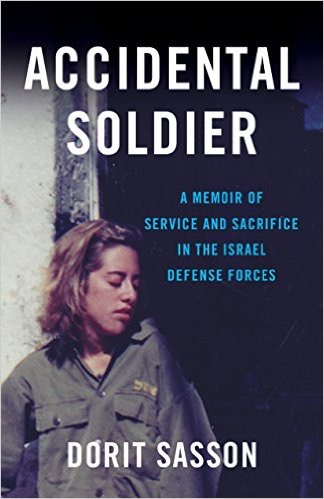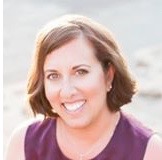 When I was in second or third grade, a young man and woman from the Israel Defense Force (IDF) came to my school to talk about their service and their life in Israel. It left a lasting impression! So, when I had the opportunity to read Dorit Sasson’s memoir, Accidental Soldier, about her time in the IDF, I was intrigued.
When I was in second or third grade, a young man and woman from the Israel Defense Force (IDF) came to my school to talk about their service and their life in Israel. It left a lasting impression! So, when I had the opportunity to read Dorit Sasson’s memoir, Accidental Soldier, about her time in the IDF, I was intrigued.
Uncertain about her future, but certain she needed distance from her dysfunctional mother, Dorit finds independence and purpose serving in the military. As we follow her journey from American teenager of Israeli descent, to soldier in the IDF, we learn as much about Israeli values and culture as we do about Dorit’s personal struggles and growth.
I’m so pleased to welcome Dorit to BCB today to talk more about her life-changing experience.
Tabitha Lord: Early on, when you first began your service with the Israel Defense Force (IDF), you second-guessed your decision. In fact, you almost left. Was there a single moment you can point to when you knew you were going to stick it out? When you felt truly committed to this path?
Dorit Sasson: In August 1990, I was approaching twenty years old, a “grandmother” by IDF standards, and I had already spent considerable time on one kibbutz which agreed to host my garin – a group of young people who do their army service together by working on kibbutzim, settlements, and army bases as part of the Nahal service.
There’s a point in my memoir when I’m sitting next to Dov, a consummate military man, who came to pay me a visit on a remote kibbutz in the middle of the Negev desert, hoping to solve my current problem. My new garin on the second kibbutz was aloof, and I was having trouble socially and culturally connecting with the cold kibbutz mentality. But I could not afford to screw this opportunity up; otherwise I’d find myself on a plane back to the States. To go back to the States would be defeating. I’d already traded college life and family for the battlefield.
When you’re up against a difficult situation that requires personal growth, you have a choice: to trust or give up. But it’s hard to follow this path when you don’t know how things will fare. When you place your trust in an unknown, you operate from a less constricted place of being. In that desert, so far away from my New York City home, I ultimately made the decision to let go of the fear. And working through a difficult moment began by trusting Dov. “Trust this man, I tell myself. Trust that everything will work out.” (Chapter 6, Accidental Soldier) Ultimately, that crazy and difficult decision made it easier to deal with various circumstances of my service from serving on a military base near the Lebanese border and in Gaza to dealing with other foreign IDF recruits in my garin.
TL: One of the most interesting things I learned about the Israeli people through your story was their commitment to community and their comfort with communal living. It makes sense to focus on social dynamics as part of the military training. The soldiers must feel bonded to one another and trust one another – their lives depend on it. But this deep commitment to society permeates the entire culture. Can you tell us a little more about how you experienced this as an American?
DS: Whereas Americans pride themselves on their individuality, Israelis tend to congregate in “wolf packs.” This mentality created a huge cultural conflict. I expected my Israeli peers to get to know me as a person instead of just haranguing me with questions: “Why did you decide to get inducted? What made you leave New York City?”
Being misunderstood made me push even harder to feel/be an Israeli in the Israel Defense Forces. I wasn’t about to tell all these Israeli soldiers the real reason for getting inducted – to prove to my Israeli father that I could be my own person away from my Mom’s fears and paranoia about Israel. They just wouldn’t understand.
As a child and teenager, I didn’t spend enough time in Israel to be familiar with this “wolf pack” mentality so I constantly felt like an outsider looking in. It was incredibly challenging. Even though I never quite felt a sense of belonging, there were moments that instilled faith in the human spirit and taught me that I didn’t have to try so hard – like in the chapter, “Green Beret” when the Russian girl in my garin who hated me from day one, saw me physically struggling to complete an eighteen kilometer march for our green beret in basic training and out of the blue, helped and supported me – those kinds of moments.
TL: The epilogue of Accidental Soldier sketches your later education at Oranim College of Education in Israel, your first teaching jobs, meeting your husband, and having your children. This could make for a Part 2 memoir! I’m wondering what made you decide to leave Israel and come back to the states?
DS: That will be the second book in the trilogy, which I’m writing now! Thank you for noticing! It was with a heavy heart that my husband and I finally made the decision to leave Israel for good. When the second Israel-Lebanese war of 2007 finally ended, it left the northern region where we lived economically depressed and when you don’t have peace, you don’t have economic security. Many of the good paying jobs were wiped out. Our kibbutz had also become privatized which meant there were very few good paying jobs available and those, unfortunately, weren’t available to him. He was forced to work as a security guard making pennies by pushing an on-off button at our kibbutz gate. This greatly saddened me. He comes with a great deal of skills!
Kibbutz members would pass through and question why he was doing labor typically reserved for college-aged students or high-schoolers. It was humiliating and nerve-wracking to watch this happen each time. We sent resumés practically everywhere and left no stone unturned. We even sent resumés to places as far south as Beersheva, about 5 hours away, but nothing turned up for him.
Alas, we had no choice but to apply for a green card at the American embassy. We knew this meant we’d be buying a one-way ticket to the States. It was one of the hardest things we’ve ever had to do – to say goodbye to friends, a support system and, of course, our lovely kibbutz home alongside the beautiful Jordan River. We did all this in the name of seeking a better financial future in my mother country, where I hadn’t really lived for eighteen years. And, of course, we had no job waiting for us in the States, so it was one big scary risk.
TL: What was the most difficult part of returning?
DS: I left the U.S. as a teenager and came back as a mother and a wife. We settled in Pittsburgh where I had no connections, no support system, no job, no nothing. I came with just 3 suitcases, a cute 2 year-old redhead son, and a big dream for us to wildly succeed in the States. A lot depended on our ability to financially succeed, otherwise we’d have to go back to Israel, and that was not an option.
After the “honeymoon” period ended, I felt an emotional, social, and cultural disconnect. It was a lonely road for a long, long time. And sometimes, it still feels quite lonely without immediate family close by. I miss Israel a lot and I wish things could have been different for us – it’s quite sad how things turned out especially for my husband. And the saddest thing is that nobody back “home” really seems to care.
TL: Your relationship with your mother was a determining factor in your decision to join the IDF. She was fearful to the point of crippling you, and in many ways she was also emotionally absent. While you present her with balance and perspective in your story, it still must have been challenging to bare this part of your soul. How much time and space did you need before you could put your experience into words?
DS: Yes, she was under-nurturing, and although I loved her in later years, I struggled to find the courage to be honest about our relationship while writing the memoir. I felt a great deal of shame over it – like how I felt the time she spat on me to prevent me from leaving to serve in the IDF. Sometimes the emotional processing got so intense that I had to actually let the writing go. I took a break for a few months because fear and doubt took over. I’d often think, “Who the heck is going to read your memoir? You’ve got nothing to say.”
When my mother passed on in 2013, I read the scene in Wild, when Cheryl Strayed’s mother passed and suddenly, the relationship with my mother had new meaning for me. I went straight into action mode. It turned out that the time away was healing.
TL: Speaking of healing, I know your mom passed after a long battle with Alzheimer’s. Were you able to come to peace in your relationship with her?
DS: Alzheimer’s is terrible in that it robs a person of everything including identity and memory. When you don’t remember, you lose everything. Mom was diagnosed at a very young age – 59 to be exact. So I really lost my mom when I turned 26 and it was a downward spiral from there. As difficult as it was, writing about her gave me peace. I came to understand that because she wasn’t the nurturing role model I really wanted as a child, I compensated by developing the other wonderful qualities I inherited from her – including her drive and determination to succeed. She was an immigrant to the US, the daughter of a Holocaust survivor, a Julliard graduate, and Fulbright scholar who was determined to be a “somebody.”
TL: I’m always interested in another writer’s process and path to publishing. How did you take Accidental Soldier from concept to draft to published work?
DS: I had seen and experienced so many crazy things in the Israel Defense Forces that shook me up. After a bullying incident, I had written in my journal “someday I intend to write a book of my experiences,” but I had no clue where that sentence would take me. That was in 1991. It would take me almost 23 years to finally feel compelled to write a book about it, which actually started with a simple blog post. Blogging about the experience made me feel more enthusiastic about telling my story, especially when people started commenting on the posts. That’s when I felt encouraged and supported.
It wasn’t until 2012 that I felt safe enough to formally write a memoir about that period of my life. Slowly I started to download various scenes. I didn’t quite know I was writing a memoir. My editor asked various questions about my IDF service, relationships, life in Israel, and terms that needed clarification. She also helped me see the big picture in each scene, and how it contributes to the narrative arc, essential to memoir writing.
Each time I forked over another revision, I trusted that she knew what she was doing and where she wanted me to go with this story, even though I didn’t know. When I got that final pat on the back, it was for a revision well earned.
The publishing part of the journey was the final transition from writer to author. Once I realized that I had a manuscript worth publishing, it was time to shop for a publisher. I opted out of the agent world when I realized what I was up against and quickly lost interest and patience. Instead I signed on with She Writes Press, a hybrid publisher. Partnership publishing was attractive and would serve and strengthen my platform, my goals, and my message without waiting 2-3 years for my book to be published. I had arrived!
TL: Let’s talk a little about your current work. Can you describe your business Giving Voice to Your Story? Tell us how you began this project, your mission and focus, and what drove you to transition from teacher to freelance writer and coach?
DS: When I moved to the States, teaching ESL seemed like a natural fit because of my teaching background and experiences living abroad. But after coming full circle to my US roots, I found that as I continued to straddle two countries, two cultures, two histories, and two languages, there was another “calling” waiting for me – coaching and writing. This took the form of Giving Voice to Your Story, a website I created in 2012 and was recognized as one of the best websites for writers in 2016. Now most recently, my platform, brand, and podcast are under my new site Giving Voice to Your Courage.
When I delved into writing my memoir and freelance writing, I documented the memoir writing and publishing process on my old site. It is from this place that I decided to give voice to the courage it took to write the memoir. The next step came in the form of giving voice to other business owners’ stories and brands. I coach and help them to write their books, whether they are non-fiction (how-to, memoir type book) or fiction.
TL: Congratulations! Accidental Soldier will be released on June 14, 2016. Are you planning any sort of celebration?
Yes! I’m uncorking the champagne bottle with friends and family and it’s a very exciting time. Even though I’ve been doing a lot of marketing, book buzz, and events prior to official release date, I’ll be celebrating along with twenty Facebook and Twitter groups on June 14th. I’ll also be doing a Meet the Author event at a local library. I’ll be sharing the news with my email subscriber list and of course, on my Facebook author page. I’ll be activating my networks. And yes…I’ll be celebrating!
Dorit Sas son was born in NYC and immigrated to Israel at age nineteen. She holds an MA in English Literature from Haifa University and teaches memoir writing workshops at the Pittsburgh Center for the Arts. She writes for a wide range of print and online publications, including The Huffington Post, and The Writer, and speaks at conferences, libraries, and community centers. She is the author of a featured chapter in Pebbles in the Pond: Transforming the World One Person at a Time, and the host of the global radio show Giving Voice to Your Story. She lives in Pittsburgh, PA, with her husband and two children. Visit her at www.DoritSasson.com.
son was born in NYC and immigrated to Israel at age nineteen. She holds an MA in English Literature from Haifa University and teaches memoir writing workshops at the Pittsburgh Center for the Arts. She writes for a wide range of print and online publications, including The Huffington Post, and The Writer, and speaks at conferences, libraries, and community centers. She is the author of a featured chapter in Pebbles in the Pond: Transforming the World One Person at a Time, and the host of the global radio show Giving Voice to Your Story. She lives in Pittsburgh, PA, with her husband and two children. Visit her at www.DoritSasson.com.



Great interview. Looking forward to reading the memoir. What an interesting and incredible story you have!
Thank you so much for your comment and for checking out the book!